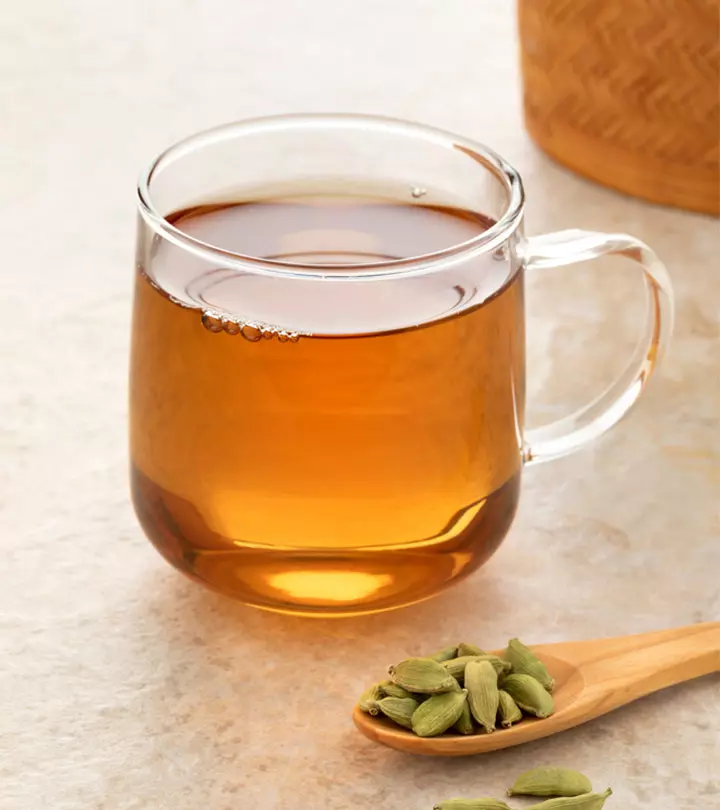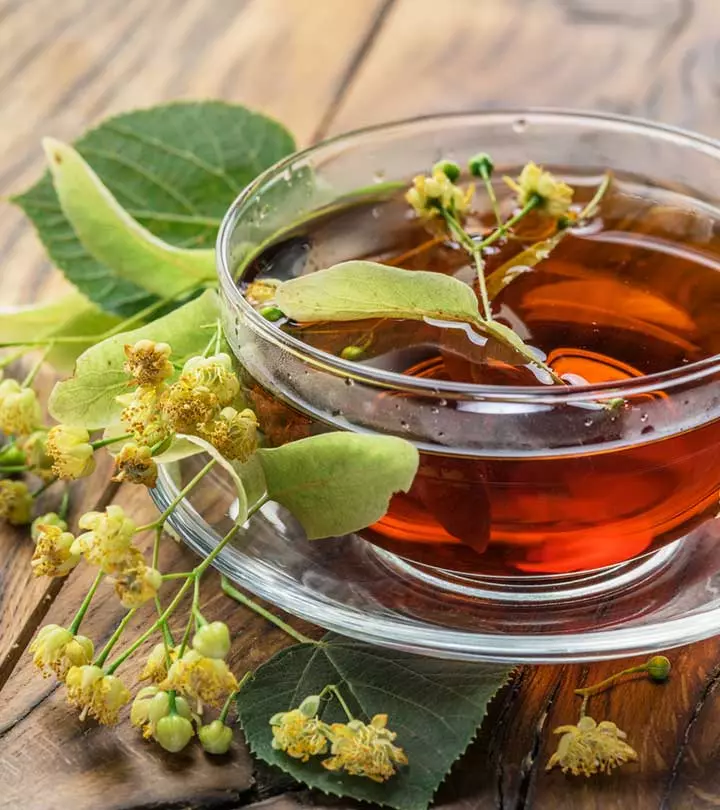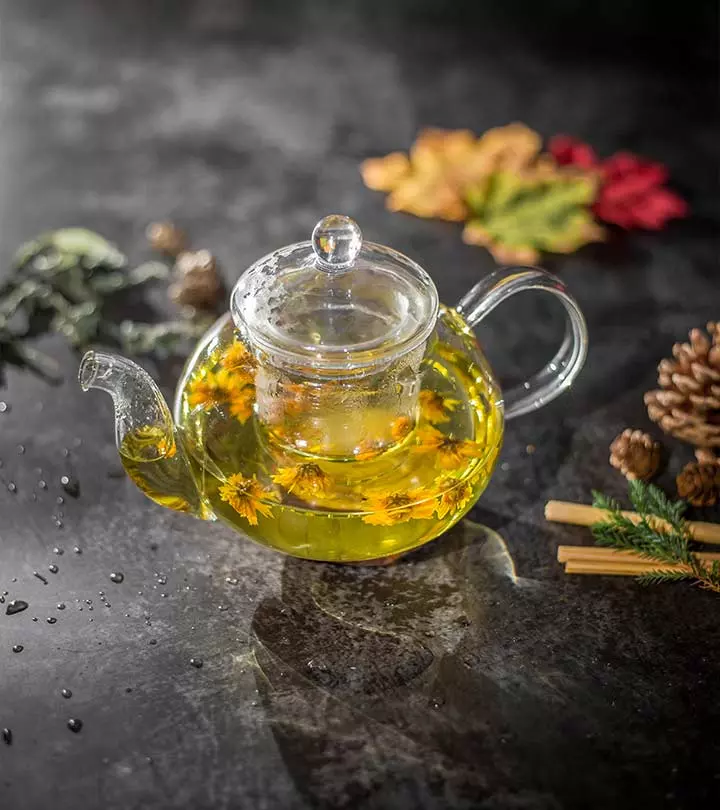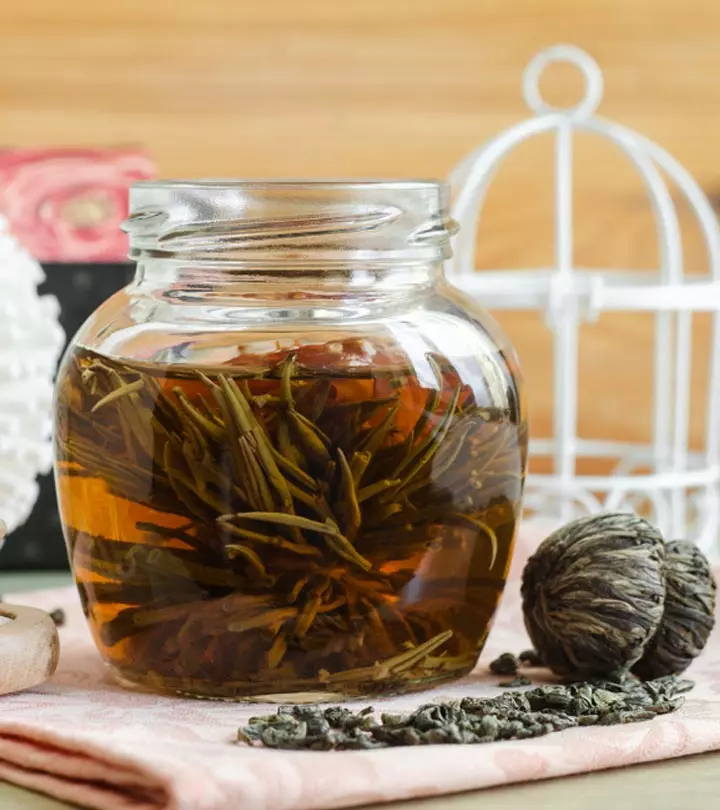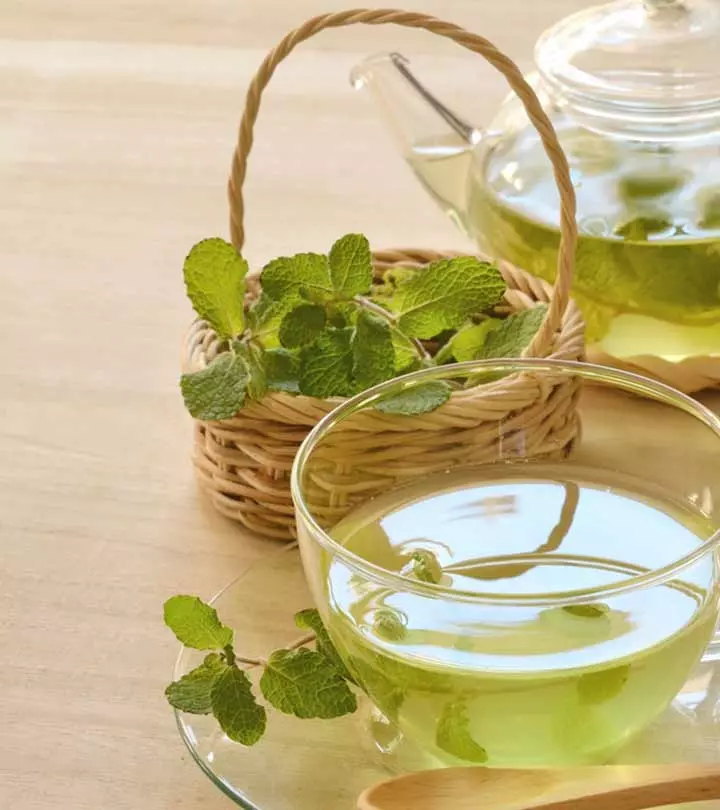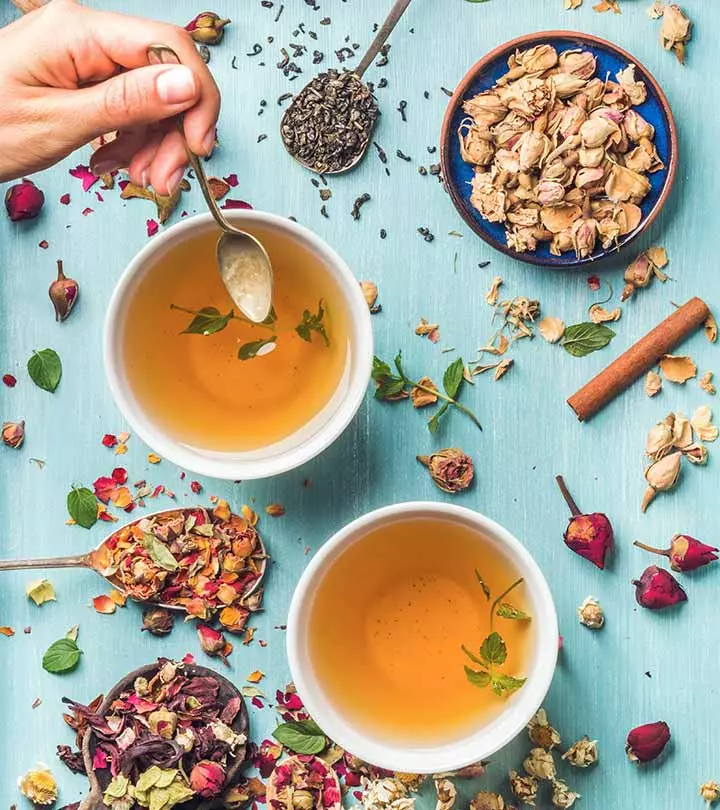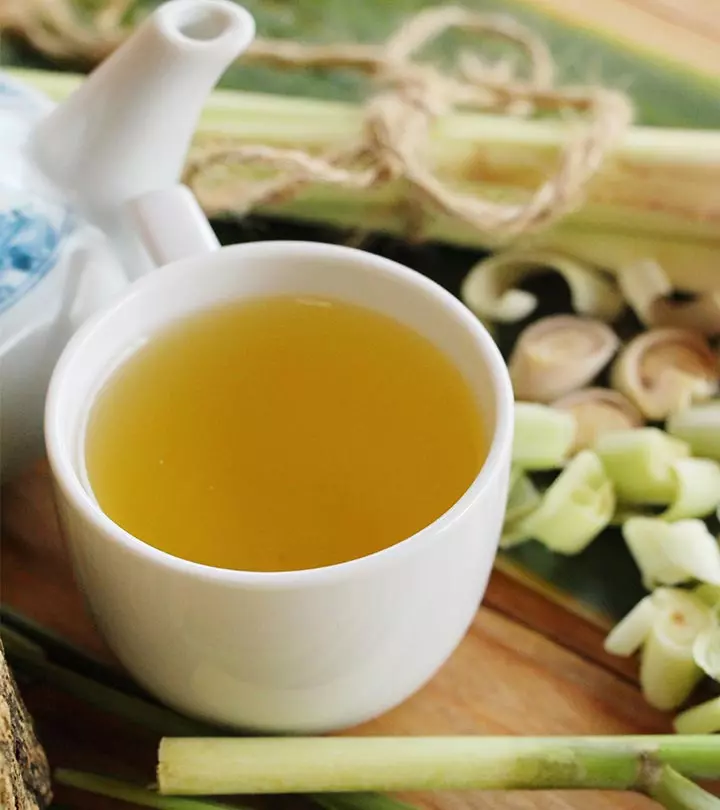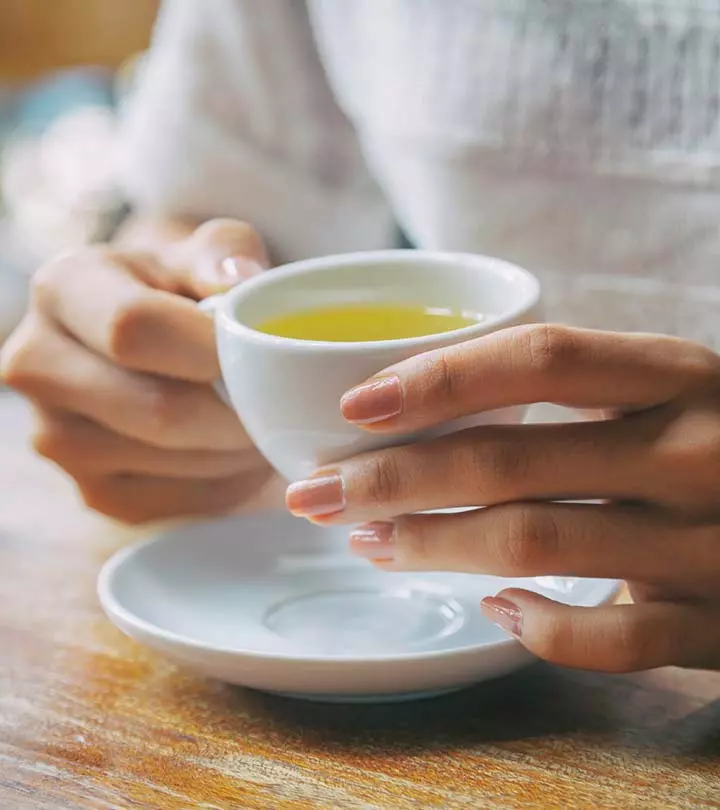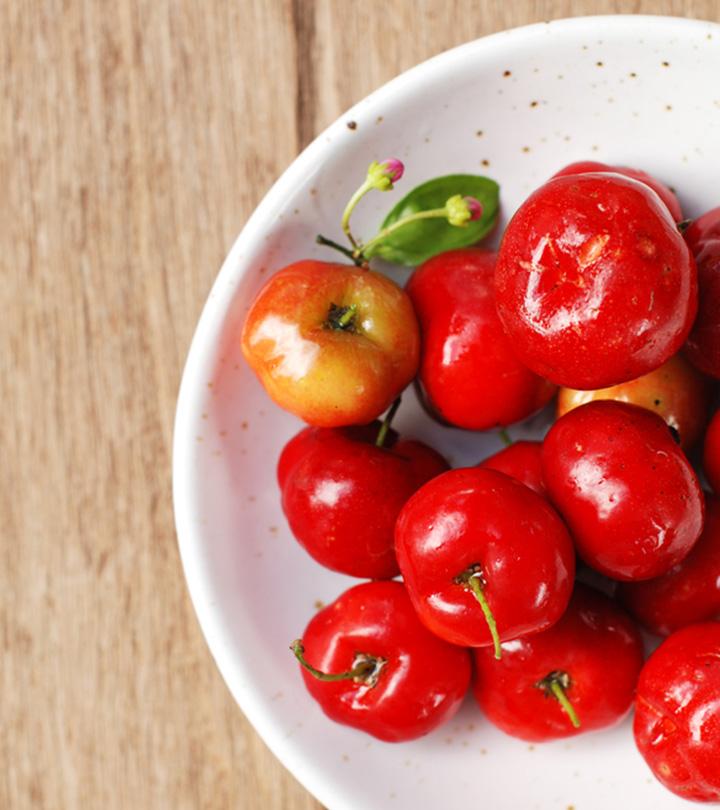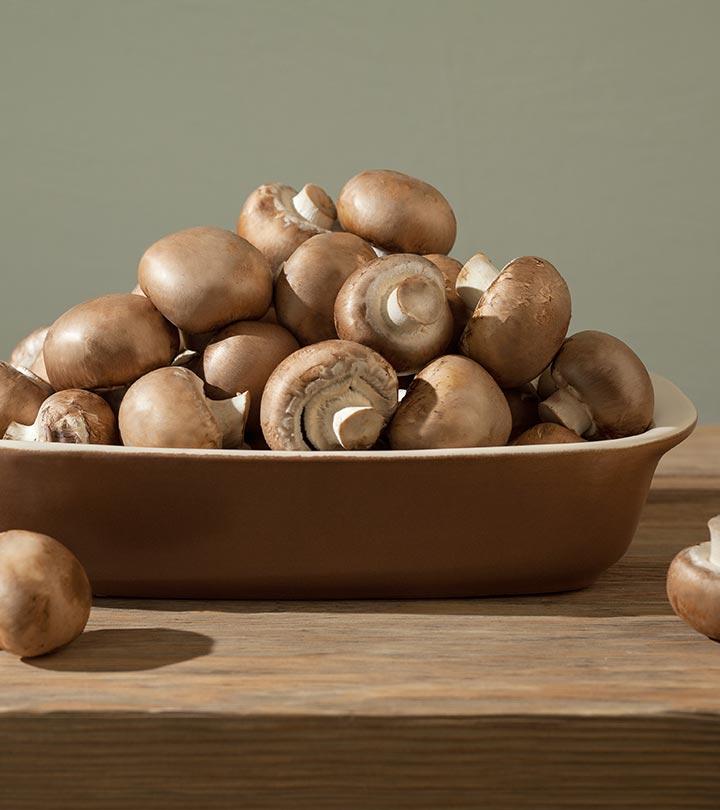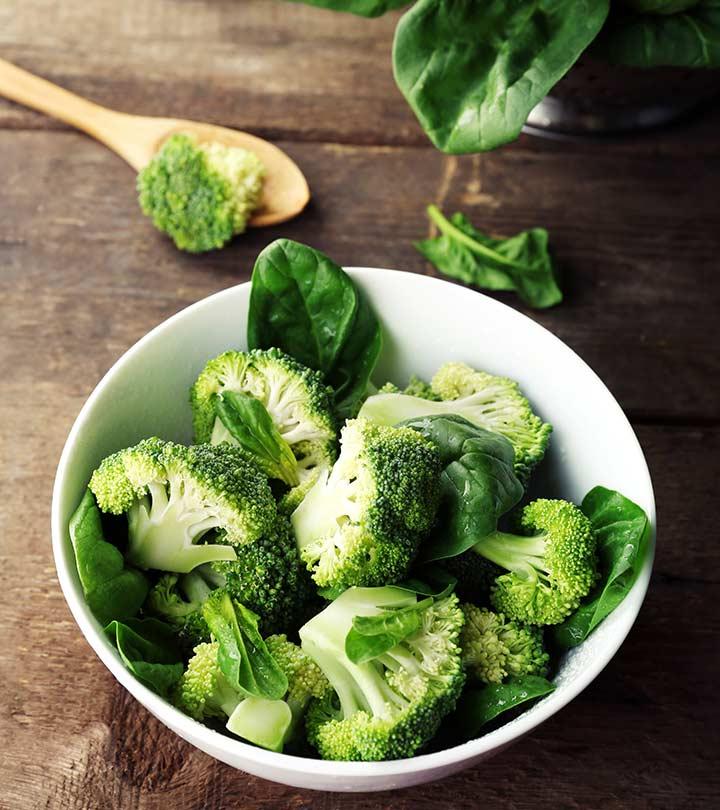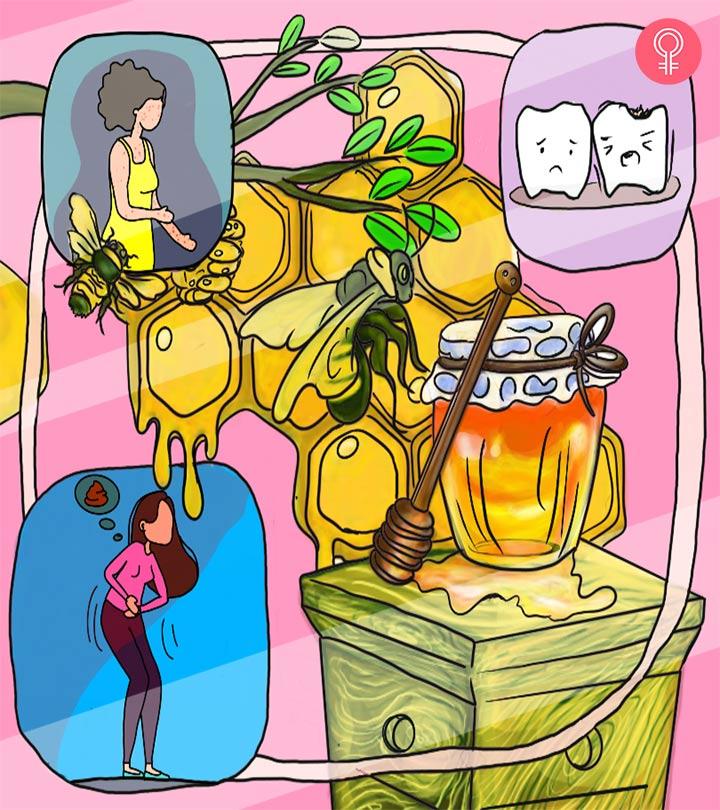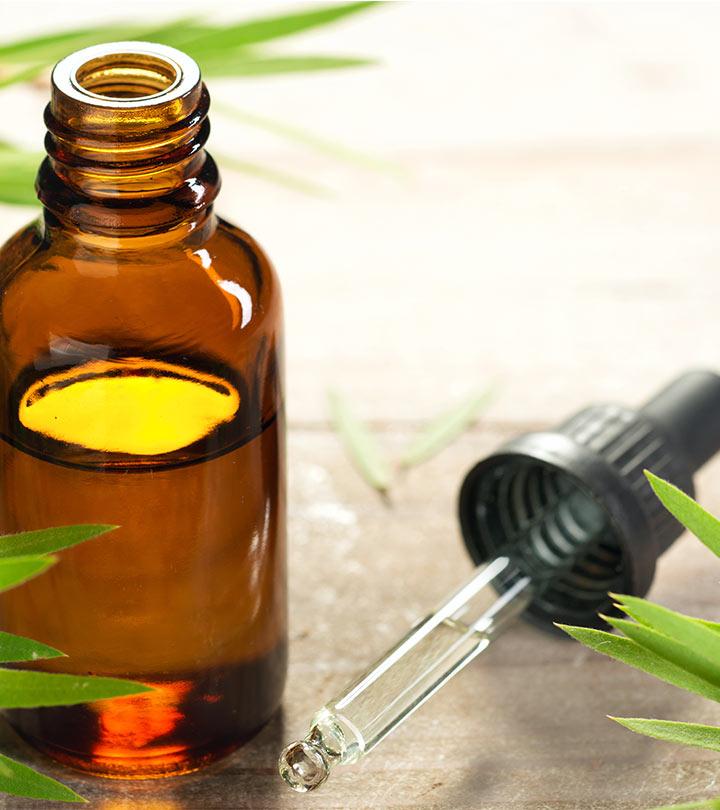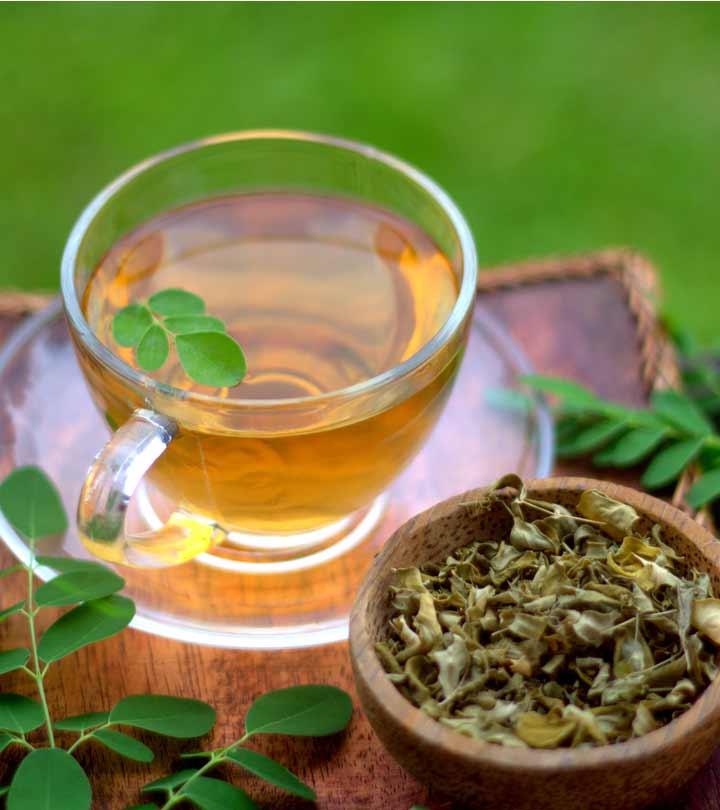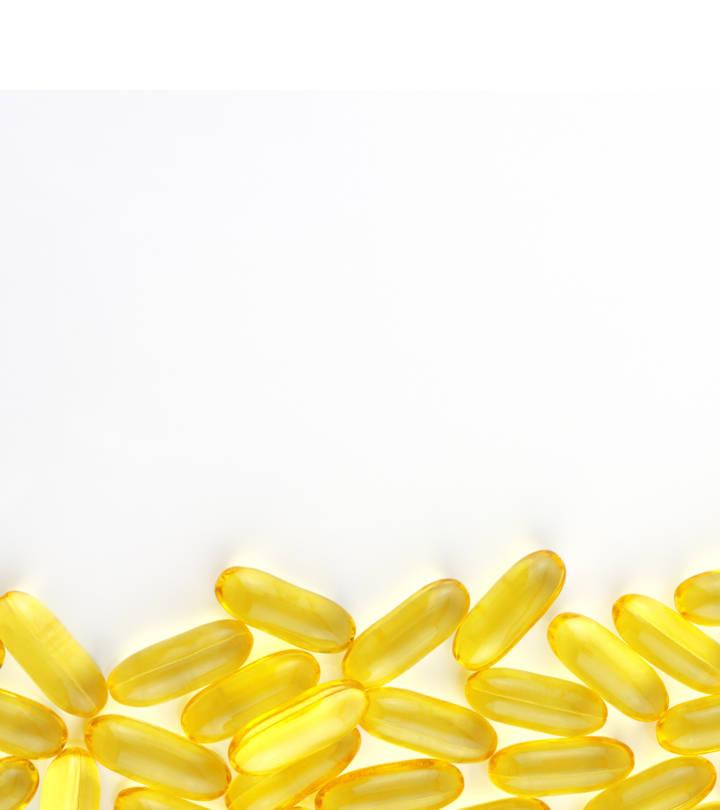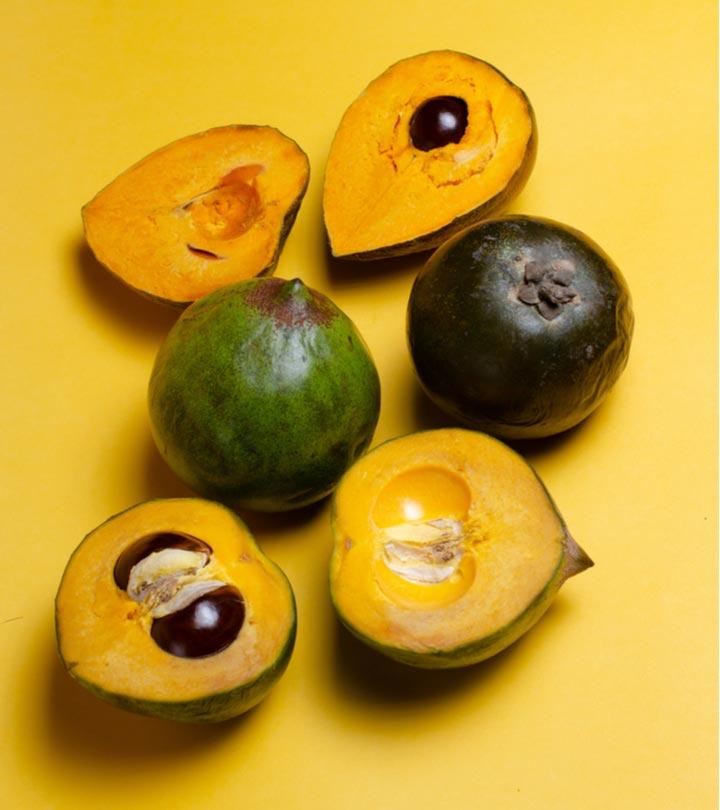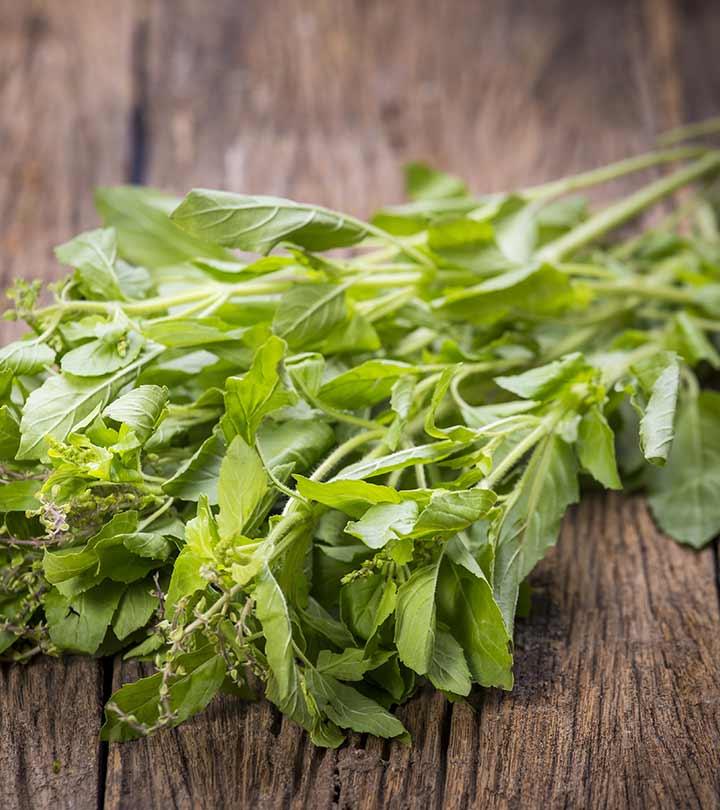Chamomile Tea Benefits, Side Effects, And Preparation
Embrace tranquility sip by sip and explore the art of brewing for a soothing experience.
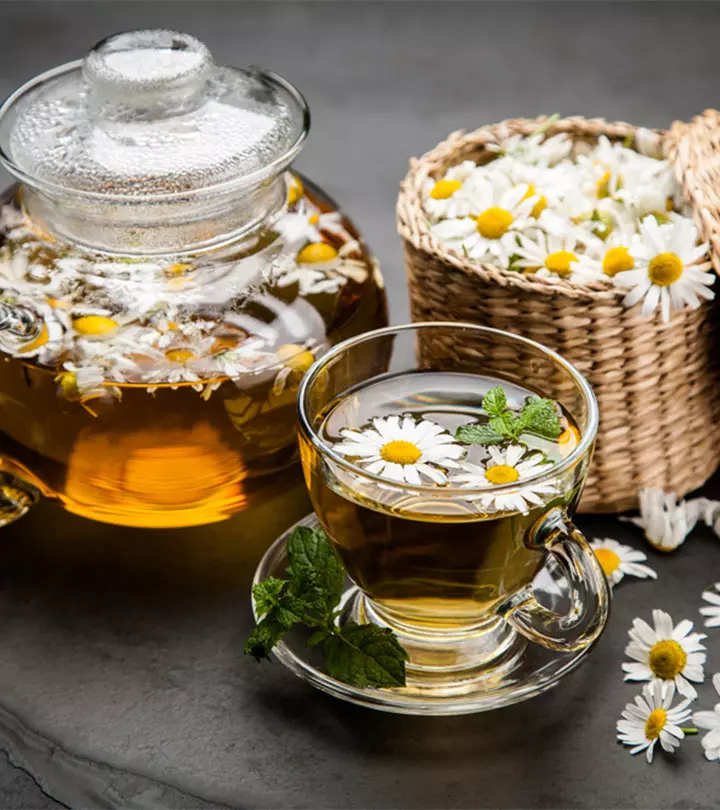
Image: Shutterstock
Chamomile tea benefits extend beyond its easy preparation and non-caffeinated nature. This golden-tinted herbal tea is made by infusing fresh or dried chamomile flowers, either loose or in tea bags. Chamomile flowers have a daisy-like appearance and are small and yellow. They belong to the Asteraceae family and come in many varieties. However, only the Roman, Egyptian, and German varieties of chamomile are used to prepare the warm brew. This article examines chamomile tea’s health benefits, how to make it, and any possible side effects. Check it out.
 Trivia
TriviaIn This Article
Health Benefits Of Chamomile Tea
1. Helps Ease PMS And Menstrual Cramps
Chamomile tea has anti-inflammatory and antispasmodic properties. It has been found to be effective in reducing premenstrual syndrome and menstrual cramps (1). As per a study conducted in 2010, women who consumed chamomile tea regularly for a month reported a considerable reduction in menstrual cramps and associated period pains (2).
A survey was conducted among 3998 women living in Stockholm who were born in 2000 about the prevalence of dysmenorrhea or period pain. It was found that 89% or 1580 of them reported having menstrual cramps or dysmenorrhea. Further 36% of them reported having severe dysmenorrhea with a high rate of fatigue and headache which reported monthly absenteeism.
2. Helps Relax And Fall Asleep
Chamomile tea is widely popular as the herbal tea that helps you destress, relax and fall asleep. It contains the antioxidant apigenin, which binds to specific receptors in your brain, calming your nerves and inducing sleepiness (3), (4). As per a study done on women in their postpartum period who were troubled with lack of sleep and depression, the ones who drank chamomile tea regularly for two weeks reported improved sleep quality than those who didn’t (5).
Researchers are of the opinion that chamomile tea might function like the prescription drug benzodiazepine that helps induce sleep by reducing anxiety (6), (7). The antioxidants in chamomile have also been known to reduce inflammation and ease migraine and tension headaches (8). While having chamomile tea before bed can help in insomnia and other sleep related disorders, its long term effects as a sedative are still unknown.
Sarah Head, a herb enthusiast, has written an elaborate blog about chamomile and its various uses from her experience. She wrote about using it to treat eczema at her friend’s suggestion, “She gave me some chamomile water in a dropper bottle. I have to admit I was sceptical but it worked (i).” She also admitted to having relieved of severe stomach pain with chamomile tea, “It tasted delicious and as I laid myself down again on the bed I could feel my whole body relaxing and I slept. The effect lasted for about four hours before the pain woke me again but this time I asked Chris to make the chamomile tea.”
 Quick Tip
Quick Tip3. Lowers Inflammation
Inflammation is our body’s natural immune response to a wound or infection. However, chronic inflammation is not good overall as it might lead to a wide range of health problems like arthritis, hemorrhoids, autoimmune disorders, gastrointestinal pain, and in some cases, depression (9).
Chamomile flowers contain volatile oils and chemical compounds that have anti-inflammatory properties (10). The chamomile tea infusion can also be used for mouthwash or gargle to help relieve any inflammation in the mucous membranes of the throat or mouth (11).
4. Slows Down Osteoporosis
Osteoporosis is a progressive bone disease that results in a decrease in bone mass and density. This in turn increases the risks of broken bones, fractures and stooped postures. While osteoporosis can affect anyone, it is more likely to be seen in post-menopausal women. This tendency of bone loss is usually attributed to reduced levels of estrogen. One treatment for osteoporosis involves Selective Estrogen Receptor Modulators (SERMs) that mimic estrogen but help avoid its harmful effects based on selective differentiation of the target tissue (12). Chamomile tea has been found to have a similar anti-estrogenic effect on the bone cells and tissue (13). Chamomile oil has also been shown to relieve knee pain and stiffness in people suffering from knee osteoporosis (14).
5. Helps Treat Diabetes And Lower Blood Sugar
In a study involving 64 people with type-2 diabetes (in the age group of 30-60 years), 32 people were asked to take chamomile tea thrice a day right after meals, for 8 weeks, and the remaining 32 took water instead. The results were conclusive about a decrease in blood sugar levels in the people who took chamomile tea regularly (15). Though studies on humans have been limited, several animal studies have shown promising effects of chamomile tea in reducing fasting blood sugar levels and preventing blood sugar spikes right after eating (16), (17). While chamomile has not been established as a viable substitute for any of the diabetes medications yet, it may potentially contribute to a reduction in disease progression and the prevention of diabetic complications (18).
6. Helps Relieve Cold Symptoms
Anecdotal evidence suggests that inhaling the aromatic steam of chamomile tea with its soothing anti-inflammatory properties helps clear the congested sinuses and relieve symptoms of common cold. Some studies have also hinted at the antibacterial effects of chamomile tea that can help with strep throat infections (19). Another study reported beneficial effects of chamomile in alleviating asthmatic symptoms in children affected with common cold (20).
7. Keeps Your Heart Healthy
Chamomile tea has been found beneficial in keeping your heart healthy by lowering the blood pressure and bad cholesterol levels (21). Chamomile tea is also rich in flavonoids, a class of antioxidants that have the potential to lower cholesterol levels and high blood pressure thereby decreasing the probability of heart disease (22). A study with 64 diabetic people reported a decrease in triglycerides and harmful LDL cholesterol levels in people who drank chamomile tea regularly (15).
8. Helps Soothe Minor Skin Irritations
While drinking chamomile tea can help you with its potential health benefits internally, applying it topically has been found effective in soothing minor skin irritations and inflammations. Adding chamomile tea to your bath water or applying it onto your skin directly has been found helpful in providing some relief from scaly and itchy skin conditions (23). Chamomile tea with its natural phytochemicals and polyphenols has been found to speed up the healing of scars and minimize the appearance of wrinkles and fine lines. Chamomile tea with its anti-inflammatory and anti-bacterial properties can thus help ease various common skin conditions (24).
9. Aids In Digestion
Chamomile tea has been traditionally used to treat colic pain in children (25). It has also been found effective in relieving irritable bowel syndrome, upset stomach, relieving gas and preventing stomach ulcers (10). Animal studies have suggested the anti-inflammatory and antispasmodic properties of chamomile to be effective in preventing diarrhea (26 ) (27).
10. May Help With Cancer Control
A study tested the impact of chamomile extract on liver cancer cells (HepG2 cells). It found that the extract led to a dose-dependent decrease in cell viability, which means that its higher concentrations led to a greater reduction in the number of cancer cells (28). Another systematic review indicated that chamomile products were effective in reducing symptoms like skin and oral issues, depression, and vomiting in individuals with cancer. It also helped improve their appetite and overall quality of life (29). Therefore, you may add chamomile tea to your daily care routine along with other therapeutic measures to reduce cancer-related suffering.
These benefits of chamomile tea are wonderful. But what good are they if you do not know how to prepare this delicious drink at home? Check out the next section for it.
How To Make Chamomile Tea
Chamomile tea has a light and airy, fruity flavor with a golden, sun-kissed color and sweet aromatic scent. A freshly brewed cup of chamomile tea feels light, warm and comforting to help you relax and de-stress anytime of the day. Here’s how you can make a cup of chamomile tea all by yourself:
Ingredients
- Fresh chamomile flowers (a handful/3-4 teaspoons)
- Water (8 ounces)
- Mint leaves/lemon (optional)
- Sweetener (optional)
Instructions
- Pluck fresh chamomile flowers from the garden and remove the stems.
- Rinse the flowers in warm water and pat them dry.
- Bring water to boil in a tea kettle or saucepan.
- Place the flowers in a tea infuser or wrap them in a piece of cheesecloth to make a tea-bag.
- Put the infuser or tea bag in the boiling water and let it steep for 5 minutes.
- Turn off the heat.
- Add sweetener or mint leaves as desired.
- Remove the infuser/tea bag from the kettle.
- Pour and enjoy the warm cup of freshly brewed chamomile tea.
Chamomile tea tastes best when made from fresh flowers. You can also directly boil the flowers in the water and use a strainer to get the clear tea. You can have chamomile tea with honey or mint as per your preference.
When not used immediately, you can wrap the flowers in a wet muslin cloth or paper towel and store them in the fridge to be used within 48 hrs.
If using dried chamomile flowers, 1 teaspoonful of dried flowers can be used for every 8 ounces of water. The same petals can be used for 2-3 infusions.
Side Effects Of Chamomile Tea
Chamomile tea has been generally found safe for most people without any evident adverse effects. However, there are certain things and conditions you must keep in mind before reaching out for that soothing cup of chamomile tea.
- Allergies
If you are allergic to any of the flowers in the daisy family like chamomile, daisies, marigolds, ragweed or chrysanthemums, you should avoid having chamomile tea. Also, if you have pollen allergy, you should be careful about having chamomile tea as the chamomile flowers could be contaminated with pollen from other plants as well.
Studies have reported that a few people who used chamomile tea for rinsing their eyes, developed severe allergic conjunctivitis (30), (31). These people were also found to be allergic to pollen. Hence, you should avoid using chamomile in any form near your eyes if you are allergic to pollen.
- Surgery
Chamomile contains small amounts of the compound coumarin, which is known to act as a blood thinner. While this should not be problematic unless taken in high doses, it’s best to avoid chamomile tea at least 2 weeks before any surgery to prevent any complications arising from medicinal interactions (32).
- Pregnancy
The effects of chamomile during pregnancy have not been studied enough to establish its safety while pregnant or breastfeeding. Even infants and young children should not be given chamomile tea as there could be possible contamination with botulism spores (33). You should thus avoid taking chamomile tea while pregnant and consult your physician before taking chamomile with any other supplements or medications.
- Medicinal Interactions
Apart from the above, people taking pain relieving or blood thinning medications for any particular health conditions, should be careful about taking chamomile tea. Since herbal teas and supplements are not regulated or scrutinized by FDA like other drugs, there might be chances of adverse medicinal interactions when chamomile tea is taken along with other medicines (34).
How Much Chamomile Tea Should You Drink?
Chamomile tea is a healthy herbal tea with many therapeutic benefits and minimal side effects. While there is no standard limit of how much chamomile to stick to, you may have one to four cups of chamomile tea per day without any potential side effects or chamomile overdose. This would roughly translate to about 900-1200 mg in powder or capsule form. Although there is a lot of promising research with respect to chamomile tea, there have not been enough human studies to establish its long-term benefits. It is, therefore, better to stick to a moderate amount of consumption without overdoing it.
Is It Ok To Drink Chamomile Tea Every Day?
Chamomile tea, though has been used in folk medicine from ancient times, should be taken as a health supplement and not as a medicine to treat any particular health condition. Though it is mostly deemed safe and relaxing, it is better to have 1-2 cups of tea daily rather than increasing the dose or frequency in want of faster results.
As you have seen above, the chamomile tea benefits are above and beyond its sleep-inducing capabilities. With its many antioxidants and polyphenolic compounds, chamomile tea not only may help overcome minor ailments like common cold and skin irritations, but also may help boost your digestive, heart and mental health altogether. Though there has been more animal-based research, still the chances of side-effects seem pretty scarce.
Whether you want to start your morning with a sense of calm or relax your frayed nerves and unwind peacefully at the end of the day, you can brew yourself a cup of this golden herbal tea, for that relaxing “me time’’ any given moment.
The benefits of chamomile tea go beyond its delicious flavor. This nutritious beverage has natural anti-inflammatory and antibacterial properties. It may help soothe menstrual cramps and skin irritations. In addition, chamomile tea may help promote digestive, heart, and bone health. Diabetes patients may also benefit from it since it helps lower blood sugar levels and prevent blood sugar spikes after a meal. However, when consumed in excess, chamomile tea can cause problems. It may trigger allergies or interfere with medications. If you experience any adverse effects, limit its use and seek medical advice.
Frequently Asked Questions
Is chamomile tea good for kidneys?
Administration of 100 mg/kg of chamomile helps treat moderate damage in mice kidneys (35). However, more studies are needed on humans.
Is chamomile good for the liver?
Yes. The methanolic extracts of chamomile flowers and fennel seeds exhibit hepatoprotective properties that can act against liver injury and oxidative stress (36).
Is chamomile good for the bladder?
The use of chamomile helps decrease the frequency of nocturia (frequent nighttime urination) in children (37).
Can I drink chamomile tea on an empty stomach?
A cup of chamomile tea in the morning may help reduce anxiety and stress with its calming effects.
Does chamomile tea make you poop?
Chamomile tea may help calm the intestine muscles and speed up bowel movements.
Should you drink chamomile tea hot or cold?
Having this caffeine-free herbal beverage hot or cold depends on your choice.
Key Takeaways
- Non-caffeinated and herbal, chamomile tea can provide a host of health benefits.
- It not only helps unwind and relax but also helps ease menstrual cramps as well.
- Chamomile tea can be easily prepared at home using fresh or dried chamomile flowers.
Chamomile tea is a wonderful solution for anxiety and stress, irrespective of the underlying cause. As soon as the soothing aroma hits your nostrils, the magical effects of this tea start. Check out the following video to know more.
Personal Experience: Source
(i) Chamomile, my new friend
https://kitchenherbwife.blogspot.com/2013/01/chamomile-my-new-friend.html
References
Articles on StyleCraze are backed by verified information from peer-reviewed and academic research papers, reputed organizations, research institutions, and medical associations to ensure accuracy and relevance. Read our editorial policy to learn more.
- Efficacy Of Chamomile In The Treatment Of Premenstrual Syndrome: A Systematic Review
https://www.ncbi.nlm.nih.gov/pmc/articles/PMC6970572/ - Chamomile Tea For Relief Of Primary Dysmenorrhea
https://www.researchgate.net/publication/286965003_Chamomile_tea_for_relief_of_primary_dysmenorrhea - Herbal Medicine For Insomnia: A Systematic Review And Meta-Analysis
https://pubmed.ncbi.nlm.nih.gov/25644982/ - Apigenin, A Component Of Matricaria Recutita Flowers, Is A Central Benzodiazepine Receptors-Ligand With Anxiolytic Effects
https://pubmed.ncbi.nlm.nih.gov/7617761/ - Effects Of An Intervention With Drinking Chamomile Tea On Sleep Quality And Depression In Sleep Disturbed Postnatal Women: A Randomized Controlled Trial
https://pubmed.ncbi.nlm.nih.gov/26483209/ - Efficacy and safety of herbal stimulants and sedatives in sleep disorders
https://www.sciencedirect.com/science/article/abs/pii/S108707929990093X - Short-Term Open-Label Chamomile (Matricaria Chamomilla L.) Therapy Of Moderate To Severe Generalized Anxiety Disorder
https://www.sciencedirect.com/science/article/abs/pii/S0944711316301891?via%3Dihub - Potential Effect And Mechanism Of Action Of Topical Chamomile (Matricaria Chammomila L.) Oil On Migraine Headache: A Medical Hypothesis
https://www.sciencedirect.com/science/article/abs/pii/S0306987714003077 - The Inflammation Theory Of Disease
https://www.ncbi.nlm.nih.gov/pmc/articles/PMC3492709/ - Chamomile: A Herbal Medicine Of The Past With Bright Future
https://www.ncbi.nlm.nih.gov/pmc/articles/PMC2995283/ - Prospective Evaluation Of A Chamomile Mouthwash For Prevention Of 5-Fu-Induced Oral Mucositis
https://pubmed.ncbi.nlm.nih.gov/8630960/ - Selective Estrogen Receptor Modulators
https://www.ncbi.nlm.nih.gov/pmc/articles/PMC4995266/ - Greek Plant Extracts Exhibit Selective Estrogen Receptor Modulator (Serm)-Like Properties
https://pubmed.ncbi.nlm.nih.gov/15537303/ - Efficacy And Safety Of Topical Matricaria Chamomilla L. (Chamomile) Oil For Knee Osteoarthritis: A Randomized Controlled Clinical Trial
https://pubmed.ncbi.nlm.nih.gov/26256137/ - Effectiveness Of Chamomile Tea On Glycemic Control And Serum Lipid Profile In Patients With Type 2 Diabetes
https://link.springer.com/article/10.1007%2Fs40618-014-0170-x - Chamomile Tea: Herbal Hypoglycemic Alternative For Conventional Medicine
https://pubmed.ncbi.nlm.nih.gov/25176245/ - Antidiabetic Effects Of Chamomile Flowers Extract In Obese Mice Through Transcriptional Stimulation Of Nutrient Sensors Of The Peroxisome Proliferator-Activated Receptor (Ppar) Family
https://www.ncbi.nlm.nih.gov/pmc/articles/PMC3827197/ - Protective Effects Of Dietary Chamomile Tea On Diabetic Complications
https://pubmed.ncbi.nlm.nih.gov/18681440/ - Potential Health Benefits Of Iraqi Chamomile Flower Water Extract On Serum Bactericidal Ability Of Children With Strep Throat
https://www.semanticscholar.org/paper/Potential-Health-Benefits-of-Iraqi-Chamomile-Flower-Tawfeeq/0e036358bd9e50f15430526af4438ba3ebc60582#paper-header - Short-Course Administration Of A Traditional Herbal Mixture Ameliorates Asthma Symptoms Of The Common Cold In Children
https://www.semanticscholar.org/paper/Short-course-administration-of-a-traditional-herbal-Javid-Haghi/c07ec23f0712bded4a1230640dd2bd9c7134ce03 - Dietary And Policy Priorities For Cardiovascular Disease, Diabetes, And Obesity – A Comprehensive Review
https://www.ncbi.nlm.nih.gov/pmc/articles/PMC4814348/ - Do Flavonoids Reduce Cardiovascular Disease Incidence or Mortality in US and European Populations?
https://www.ncbi.nlm.nih.gov/pmc/articles/PMC4130174/ - Practical Uses Of Botanicals In Skin Care
https://www.ncbi.nlm.nih.gov/pmc/articles/PMC2958188/ - Topical Effects Of Chamomilla Recutita In Skin Damage: A Literature Review
https://www.researchgate.net/publication/289263589_Topical_effects_of_Chamomilla_Recutita_in_skin_damage_A_literature_review - Clinical Inquiries. What Is The Best Treatment For Infants With Colic?
https://pubmed.ncbi.nlm.nih.gov/16822454/ - Antidiarrheal And Antioxidant Activities Of Chamomile (Matricaria Recutita L.) Decoction Extract In Rats
https://pubmed.ncbi.nlm.nih.gov/24463157/ - Antidiarrhoeal, Antisecretory And Antispasmodic Activities Of Matricaria Chamomilla Are Mediated Predominantly Through K(+)-Channels Activation
https://pubmed.ncbi.nlm.nih.gov/25886126/ - Antioxidant and anticancer activities of chamomile (Matricaria recutita L.)
https://www.ncbi.nlm.nih.gov/pmc/articles/PMC6317209/ - Effect of chamomile on the complications of cancer: a systematic review
https://www.ncbi.nlm.nih.gov/pmc/articles/PMC10108427/ - Allergic Conjunctivitis To Chamomile Tea
https://pubmed.ncbi.nlm.nih.gov/2382873/ - Anaphylactic Reaction After The Ingestion Of Chamomile Tea: A Study Of Cross-Reactivity With Other Composite Pollens
https://pubmed.ncbi.nlm.nih.gov/2674263/ - Warfarin Interaction With Matricaria Chamomilla
https://www.ncbi.nlm.nih.gov/pmc/articles/PMC1435958/ - Presence Of Clostridium Botulinum Spores In Matricaria Chamomilla (Chamomile) And Its Relationship With Infant Botulism
https://pubmed.ncbi.nlm.nih.gov/18068252/ - Herbal Medication: Potential For Adverse Interactions With Analgesic Drugs
https://pubmed.ncbi.nlm.nih.gov/12472978/ - EVALUATION OF THE PROTECTIVE EFFECT OF AQUEOUS EXTRACT OF MATRICARIA CHAMOMILLA ON KIDNEY AND ACTH HORMONE IN MALE MICE
https://www.researchgate.net/publication/349573686_EVALUATION_OF_THE_PROTECTIVE_EFFECT_OF_AQUEOUS_EXTRACT_OF_MATRICARIA_CHAMOMILLA_ON_KIDNEY_AND_ACTH_HORMONE_IN_MALE_MICE - Preventive role of chamomile flowers and fennel seeds extracts against liver injury and oxidative stress induced by an immunosuppressant drug in rats
https://www.researchgate.net/publication/283788335_Preventive_role_of_chamomile_flowers_and_fennel_seeds_extracts_against_liver_injury_and_oxidative_stress_induced_by_an_immunosuppressant_drug_in_rats - Topical use of matricaria recutita l (chamomile) oil in the treatment of monosymptomatic enuresis in children
https://www.ncbi.nlm.nih.gov/pmc/articles/PMC5871195/
Read full bio of Tracy Tredoux
Read full bio of Ravi Teja Tadimalla
Read full bio of Sindhu Koganti





